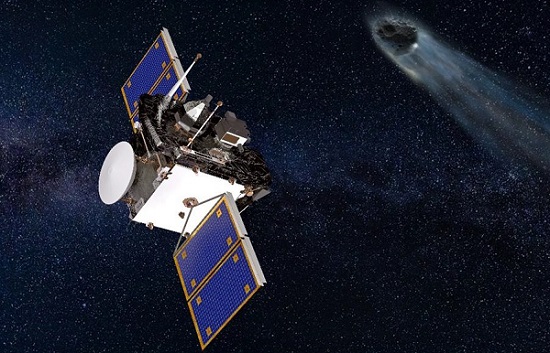Engineering and technology group SENER will lead the design and manufacture of the space probe and scientific instruments for the Comet Interceptor mission of the European Space Agency (ESA). SENER, in cooperation with the Japanese Space Agency (JAXA), will develop a spacecraft and probe that will comprise a range of imaging systems and will be used to gather information from infrared, visible, and ultraviolet vantage points.
The mission will be launched in 2029 with the aim of visiting and studying a pristine comet — a comet that has not previously entered the solar system, and with physical and chemical properties that are unchanged since its birth due to never having approached the sun. The target will be a celestial body — probably originating in the Oort cloud, a structure located at the limits of the solar system — where fluctuations caused by gravitational forces occasionally hurl some object toward the sun, making it a periodic comet that has not yet completed an orbit. The SENER capsule will be just over 0.5 m in diameter, just under 1 m in height, and about 40 kg in weight.
SENER signed a contract to spearhead the instrument-development initiative with OHB Italia, which leads the mission and the production of its spacecraft.

SENER’s probe (octagonal pyramid on top of the Comet Interceptor spacecraft), prepared to be launched to the comet. Courtesy of SENER.
Key to the craft’s instrumentation will be the MIRMIS instrument, which will provide data on carbon dioxide, water, ice, carbon monoxide, mineral compositions, and thermophysical data by imaging in the 0.9- to 25-μm wavelength range. Hyper- and multispectral imaging systems make up the MIRMIS instrument. In addition, the Hydrogen Imager, a Cassegrain-type UV imager equipped with bandpass filters, will characterize water production rate and spatial variation, as well as isotope ratio and temperature. Finally, the EnViss (Entire Visible Sky) camera will use a fish-eye lens with a 180º field of view to study the comet dust environment, including the radiance and polarization of the comet in the wavelength range of 550 to 800 nm.
“The mission faces enormous technological challenges, with perhaps the most difficult one being surviving the hostile environment of particles around the comet, with severe limitations on the mass and power available,” said Jose María Fernandez Ibarz, project manager at SENER.
According to Demetrio Zorita, business development manager at SENER, pristine comets like those that the ESA mission plans to study are of high interest due to the information they can provide about the origins of the world. “By exploring their surface, we observe the formation of the solar system and Earth four and a half billion years ago,” he said.